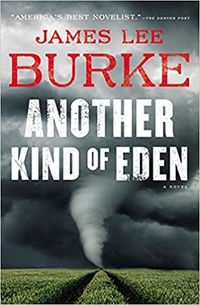Another Kind of Eden by James Lee Burke
 Monday, August 16, 2021 at 7:58AM
Monday, August 16, 2021 at 7:58AM 
Published by Simon & Schuster on August 17, 2021
Another Kind of Eden takes place when Aaron Holland Broussard is 26. Aaron has been to war, earned a degree, and written a novel. He describes himself as “a failed English instructor.” Aaron was a teenager when he appeared in The Jealous Kind, one of my favorite James Lee Burke novels.
As a post-war drifter, Aaron “learned quickly that the Other America was a complex culture held together by the poetry of Walt Whitman, the songs of Woody Guthrie, and the prose of Jack Kerouac.” Aaron spends the spring and summer of 1962 working on a dairy and produce farm in Colorado. The owner, Jude Lowry, is a decent man. Aaron is sufficiently decent to resist the advances made by Lowry’s wife.
Aaron works with Spud Caudill and Cotton Williams, two men who have his back when he’s attacked for driving a truck that has a union sticker. The Sheriff, Wade Benbow, briefly locks up Aaron despite his correct suspicion that the fight was started by Darrel Vickers, whose father Rueben is a well-connected rancher. Darrel is suspected of killing a little girl by locking her in a refrigerator when he was still a child.
Aaron learns the identity of his attacker from Jo Anne McGuffy, a waitress who paints macabre scenes in her spare time. Her paintings are based on the Ludlow Massacre, a mass killing of striking workers perpetrated by anti-labor militia members in 1914. Over the course of the novel, Aaron falls in love with Jo Anne, although she’s sleeping with her professor, Henri Devos, and if Darrel is worthy of belief, has been his lover, as well.
The plot involves threats to various people, mostly women, including Jo Anne and some women on a hippie bus who are being pimped out. They hippies “were the detritus of a Puritan culture, one that made mincemeat of its children and left them marked from head to foot with every violation of the body that can be imposed on a human being: state homes, sexual molestation, sodomy, gang bangs, reformatory tats, fundamentalist churches . . . . Their hallmark was the solemnity, anger, and pain in their eyes.” Spud is a suspect when a hooker turns up dead (because Spud works so that he can afford to visit hookers), but Aaron has seen no evil in Spud’s heart. Another woman, one of the hippies on the bus, is hospitalized for reasons that nobody wants to discuss.
Aaron saw more than his share of evil during the Korean War; he blames himself for a loss of an MIA friend. Benbow saw his share when he liberated a subcamp of Dachau. The notion of evil as a force is a popular theme among thriller writers who try to understand and explain the human condition. Burke has turned to that theme again and again, sometimes envisioning evil as the offspring of the supernatural. There are supernatural elements in Another Kind of Eden, including a war buddy who appears from the dead and creates a miracle at a delicate moment. Apparent demons and glimpses of ghosts, perhaps real and perhaps not, pop up near the story’s end. While I could have done without the supernatural, I always appreciate Burke’s effort to comprehend the absence of compassion and decency in human behavior.
Aaron learns something about himself as he struggles against evil men. He comes to accept that “the Holland legacy of violence and mayhem had always lived inside me,” but the acceptance of his inner demons gives him peace without encouraging him to embrace the violence. He instead embraces the inevitability of death: “As Stephen Crane wrote at the close of The Red Badge of Courage, the great death was only the great death, not to be sought, not to be feared, but treated as an inconsequential player in the human comedy.”
The supernatural elements put me off a bit, making me rank Another Kind of Eden below Burke’s best work. But novels that are not Burke’s best are better novels than most crime writers can compose. Burke’s prose style and the depth of his thought make him one of my three favorite writers of crime fiction and one of the best writers of American fiction in or outside of any genre.
RECOMMENDED
Reader Comments